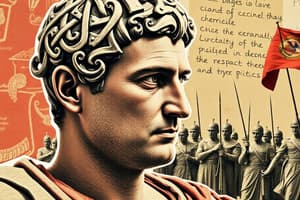Podcast
Questions and Answers
What was one of the major concerns about Julius Caesar's rise to power?
What was one of the major concerns about Julius Caesar's rise to power?
- He refused to conquer foreign lands.
- He eliminated the military completely.
- He was too supportive of the Senate.
- He was perceived to want to become king. (correct)
What significant event is referred to as the Ides of March?
What significant event is referred to as the Ides of March?
- The beginning of the civil wars in Rome.
- The day Julius Caesar was attacked and assassinated. (correct)
- The battle where Caesar was first defeated.
- The day Augustus was proclaimed emperor.
What was Julius Caesar's relationship with Pompey and Crassus?
What was Julius Caesar's relationship with Pompey and Crassus?
- They were senators supporting the Republic against Caesar.
- Pompey was Caesar's father, and Crassus was his brother.
- They were rivals who fought for control of Rome.
- They were allies who formed the First Triumvirate. (correct)
What title did Octavian take after becoming the sole ruler of Rome?
What title did Octavian take after becoming the sole ruler of Rome?
Flashcards
Pax Romana
Pax Romana
A period of peace and prosperity in the Roman Empire that lasted for about 200 years. This era saw advancements in trade, infrastructure, and culture.
Julius Caesar
Julius Caesar
The powerful Roman general who conquered Gaul (France) and was later assassinated for attempting to become king.
Princeps
Princeps
The title Augustus took, meaning "first citizen." Although he appeared to give up his power to the Senate, he maintained control by wielding a vast amount of influence.
Cicero
Cicero
Signup and view all the flashcards
The Ides of March
The Ides of March
Signup and view all the flashcards
The First Triumvirate
The First Triumvirate
Signup and view all the flashcards
Augustus' Rise to Power
Augustus' Rise to Power
Signup and view all the flashcards
Roman Trade
Roman Trade
Signup and view all the flashcards
Study Notes
Roman Republic to Empire
- Rome was dangerous in 70 BC, with politicians and generals vying for power.
- Cicero, a philosopher and public speaker, advocated for shared power among the upper classes and limiting the power of generals.
- Julius Caesar, a powerful general, rose to prominence between 58 BC and 50 BC by conquering Gaul (France).
- Caesar's popularity and military victories were challenged.
- He refused to relinquish command of his armies and was eventually defeated by Pompey in 48 BC.
- Pompey was killed, and Caesar returned to Rome to establish himself as dictator.
- Caesar's actions angered senators.
- He was assassinated on March 15, 44 BC (the "Ides of March").
- Following Caesar's death, several figures arose to power: Mark Antony, Octavian (later Augustus), and others.
- Political upheaval and power struggles continued after Caesar's death.
- Octavian, through various conflicts, ultimately consolidated power and became sole ruler of Rome.
- In 27 BC, Octavian transitioned to a position of power shared with the Senate and was referred to as "first citizen."
Roman Empire
- Augustus and subsequent emperors expanded the Empire, leading to increased trade.
- Raw materials and exotic goods were sought and traded.
- The Pax Romana, a period of peace and prosperity lasting from around the late 200s BC to AD 180 , was ushered in by the Romans.
- Romans had significant contributions in these areas: science, engineering, medicine, architecture, and art.
- Aqueducts are examples of advanced Roman architecture utilized for water transport.
- The Roman legal system, known as civil law, greatly influenced legal systems throughout the world.
- The Roman Empire developed effective administration for a large and complex empire.
- Literature thrived, including works like Virgil's Aeneid, and Roman mythology.
- Latin language influenced the development of Italian, French, Spanish, Portuguese, and Romanian.
Studying That Suits You
Use AI to generate personalized quizzes and flashcards to suit your learning preferences.




